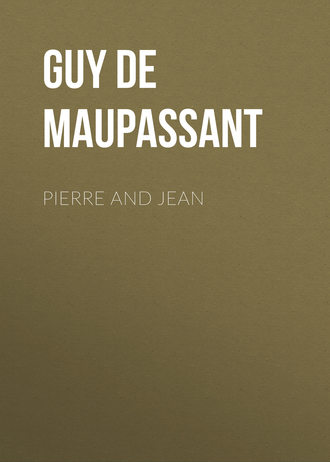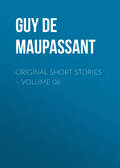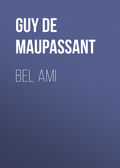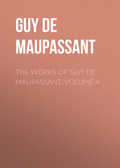
Ги де Мопассан
Pierre and Jean
CHAPTER IX
Letters of recommendation from Professors Mas-Roussel, Remusot, Flache, and Borriquel, written in the most flattering terms with regard to Dr. Pierre Roland, their pupil, had been submitted by M. Marchand to the directors of the Transatlantic Shipping Co., seconded by M. Poulin, judge of the Chamber of Commerce, M. Lenient, a great ship-owner, and Mr. Marival, deputy to the Mayor of Havre, and a particular friend of Captain Beausires’s. It proved that no medical officer had yet been appointed to the Lorraine, and Pierre was lucky enough to be nominated within a few days.
The letter announcing it was handed to him one morning by Josephine, just as he was dressed. His first feeling was that of a man condemned to death who is told that his sentence is commuted; he had an immediate sense of relief at the thought of his early departure and of the peaceful life on board, cradled by the rolling waves, always wandering, always moving. His life under his father’s roof was now that of a stranger, silent and reserved. Ever since the evening when he allowed the shameful secret he had discovered to escape him in his brother’s presence, he had felt that the last ties to his kindred were broken. He was harassed by remorse for having told this thing to Jean. He felt that it was odious, indecent, and brutal, and yet it was a relief to him to have uttered it.
He never met the eyes either of his mother or his brother; to avoid his gaze theirs had become surprisingly alert, with the cunning of foes who fear to cross each other. He was always wondering: “What can she have said to Jean? Did she confess or deny it? What does my brother believe? What does he think of her – what does he think of me?” He could not guess, and it drove him to frenzy. And he scarcely ever spoke to them, excepting when Roland was by, to avoid his questioning.
As soon as he received the letter announcing his appointment he showed it at once to his family. His father, who was prone to rejoicing over everything, clapped his hands. Jean spoke seriously, though his heart was full of gladness: “I congratulate you with all my heart, for I know there were several other candidates. You certainly owe it to your professors’ letters.”
His mother bent her head and murmured:
“I am very glad you have been successful.”
After breakfast he went to the Company’s offices to obtain information on various particulars, and he asked the name of the doctor on board the Picardie, which was to sail next day, to inquire of him as to the details of his new life and any details he might think useful.
Dr. Pirette having gone on board, Pierre went to the ship, where he was received in a little state-room by a young man with a fair beard, not unlike his brother. They talked together a long time.
In the hollow depths of the huge ship they could hear a confused and continuous commotion; the noise of bales and cases pitched down into the hold mingling with footsteps, voices, the creaking of the machinery lowering the freight, the boatswain’s whistle, and the clatter of chains dragged or wound on to capstans by the snorting and panting engine which sent a slight vibration from end to end of the great vessel.
But when Pierre had left his colleague and found himself in the street once more, a new form of melancholy came down on him, enveloping him like the fogs which roll over the sea, coming up from the ends of the world and holding in their intangible density something mysteriously impure, as it were the pestilential breath of a far-away, unhealthy land.
In his hours of greatest suffering he had never felt himself so sunk in a foul pit of misery. It was as though he had given the last wrench; there was no fibre of attachment left. In tearing up the roots of every affection he had not hitherto had the distressful feeling which now came over him, like that of a lost dog. It was no longer a torturing mortal pain, but the frenzy of a forlorn and homeless animal, the physical anguish of a vagabond creature without a roof for shelter, lashed by the rain, the wind, the storm, all the brutal forces of the universe. As he set foot on the vessel, as he went into the cabin rocked by the waves, the very flesh of the man, who had always slept in a motionless and steady bed, had risen up against the insecurity henceforth of all his morrows. Till now that flesh had been protected by a solid wall built into the earth which held it, by the certainty of resting in the same spot, under a roof which could resist the gale. Now all that, which it was a pleasure to defy in the warmth of home, must become a peril and a constant discomfort. No earth under foot, only the greedy, heaving, complaining sea; no space around for walking, running, losing the way, only a few yards of planks to pace like a convict among other prisoners; no trees, no gardens, no streets, no houses; nothing but water and clouds. And the ceaseless motion of the ship beneath his feet. On stormy days he must lean against the wainscot, hold on to the doors, cling to the edge of the narrow berth to save himself from rolling out. On calm days he would hear the snorting throb of the screw, and feel the swift flight of the ship, bearing him on in its unpausing, regular, exasperating race.
And he was condemned to this vagabond convict’s life solely because his mother had yielded to a man’s caresses.
He walked on, his heart sinking with the despairing sorrow of those who are doomed to exile. He no longer felt a haughty disdain and scornful hatred of the strangers he met, but a woeful impulse to speak to them, to tell them all that he had to quit France, to be listened to and comforted. There was in the very depths of his heart the shame-faced need of a beggar who would fain hold out his hand – a timid but urgent need to feel that some one would grieve at his departing.
He thought of Marowsko. The old Pole was the only person who loved him well enough to feel true and keen emotion, and the doctor at once determined to go and see him.
When he entered the shop, the druggist, who was pounding powders in a marble mortar, started and left his work.
“You are never to be seen nowadays,” said he.
Pierre explained that he had had a great many serious matters to attend to, but without giving the reason, and he took a seat, asking:
“Well, and how is business doing?”
Business was not doing at all. Competition was fearful, and rich folks rare in that workmen’s quarter. Nothing would sell but cheap drugs, and the doctors did not prescribe the costlier and more complicated remedies on which a profit is made of five hundred per cent. The old fellow ended by saying: “If this goes on for three months I shall shut up shop. If I did not count on you, dear good doctor, I should have turned shoe-black by this time.”
Pierre felt a pang, and made up his mind to deal the blow at once, since it must be done.
“I – oh, I cannot be of any use to you. I am leaving Havre early next month.”
Marowsko took off his spectacles, so great was his agitation.
“You! You! What are you saying?”
“I say that I am going away, my poor friend.”
The old man was stricken, feeling his last hope slipping from under him, and he suddenly turned against this man, whom he had followed, whom he loved, whom he had so implicitly trusted, and who forsook him thus.
He stammered out:
“You are surely not going to play me false – you?”
Pierre was so deeply touched that he felt inclined to embrace the old fellow.
“I am not playing you false. I have not found anything to do here, and I am going as medical officer on board a Transatlantic passenger boat.”
“O Monsieur Pierre! And you always promised you would help me to make a living!”
“What can I do? I must make my own living. I have not a farthing in the world.”
Marowsko said: “It is wrong; what you are doing is very wrong. There is nothing for me but to die of hunger. At my age this is the end of all things. It is wrong. You are forsaking a poor old man who came here to be with you. It is wrong.”
Pierre tried to explain, to protest, to give reasons, to prove that he could not have done otherwise; the Pole, enraged by his desertion, would not listen to him, and he ended by saying, with an allusion no doubt to political events:
“You French – you never keep your word!”
At this Pierre rose, offended on his part, and taking rather a high tone he said:
“You are unjust, pere Marowsko; a man must have very strong motives to act as I have done and you ought to understand that. Au revoir – I hope I may find you more reasonable.” And he went away.
“Well, well,” he thought, “not a soul will feel a sincere regret for me.”
His mind sought through all the people he knew or had known, and among the faces which crossed his memory he saw that of the girl at the tavern who had led him to doubt his mother.
He hesitated, having still an instinctive grudge against her, then suddenly reflected on the other hand: “After all, she was right.” And he looked about him to find the turning.
The beer-shop, as it happened, was full of people, and also full of smoke. The customers, tradesmen, and labourers, for it was a holiday, were shouting, calling, laughing, and the master himself was waiting on them, running from table to table, carrying away empty glasses and returning them crowned with froth.
When Pierre had found a seat not far from the desk he waited, hoping that the girl would see him and recognise him. But she passed him again and again as she went to and fro, pattering her feet under her skirts with a smart little strut. At last he rapped a coin on the table, and she hurried up.
“What will you take, sir?”
She did not look at him; her mind was absorbed in calculations of the liquor she had served.
“Well,” said he, “this is a pretty way of greeting a friend.”
She fixed her eyes on his face. “Ah!” said she hurriedly. “Is it you? You are pretty well? But I have not a minute to-day. A bock did you wish for?”
“Yes, a bock!”
When she brought it he said:
“I have come to say good-bye. I am going away.”
And she replied indifferently:
“Indeed. Where are you going?”
“To America.”
“A very fine country, they say.”
And that was all!
Really, he was very ill-advised to address her on such a busy day; there were too many people in the cafe.
Pierre went down to the sea. As he reached the jetty he descried the Pearl; his father and Beausire were coming in. Papagris was pulling, and the two men, seated in the stern, smoked their pipes with a look of perfect happiness. As they went past the doctor said to himself: “Blessed are the simple-minded!” And he sat down on one of the benches on the breakwater, to try to lull himself in animal drowsiness.
When he went home in the evening his mother said, without daring to lift her eyes to his face:
“You will want a heap of things to take with you. I have ordered your under-linen, and I went into the tailor’s shop about cloth clothes; but is there nothing else you need – things which I, perhaps, know nothing about?”
His lips parted to say, “No, nothing.” But he reflected that he must accept the means of getting a decent outfit, and he replied in a very calm voice: “I hardly know myself, yet. I will make inquiries at the office.”
He inquired, and they gave him a list of indispensable necessaries. His mother, as she took it from his hand, looked up at him for the first time for very long, and in the depths of her eyes there was the humble expression, gentle, sad, and beseeching, of a dog that has been beaten and begs forgiveness.
On the 1st of October the Lorraine from Saint-Nazaire, came into the harbour of Havre to sail on the 7th, bound for New York, and Pierre Roland was to take possession of the little floating cabin in which henceforth his life was to be confined.
Next day as he was going out, he met his mother on the stairs waiting for him, to murmur in an almost inaudible voice:
“You would not like me to help you to put things to rights on board?”
“No, thank you. Everything is done.”
Then she said:
“I should have liked to see your cabin.”
“There is nothing to see. It is very small and very ugly.”
And he went downstairs, leaving her stricken, leaning against the wall with a wan face.
Now Roland, who had gone over the Lorraine that very day, could talk of nothing all dinnertime but this splendid vessel, and wondered that his wife should not care to see it as their son was to sail on board.
Pierre had scarcely any intercourse with his family during the days which followed. He was nervous, irritable, hard, and his rough speech seemed to lash every one indiscriminately. But the day before he left he was suddenly quite changed, and much softened. As he embraced his parents before going to sleep on board for the first time he said:
“You will come to say good-bye to me on board, will you not?”
Roland exclaimed:
“Why, yes, of course – of course, Louise?”
“Certainly, certainly,” she said in a low voice.
Pierre went on: “We sail at eleven precisely. You must be there by half-past nine at the latest.”
“Hah!” cried his father. “A good idea! As soon as we have bid you good-bye, we will make haste on board the Pearl, and look out for you beyond the jetty, so as to see you once more. What do you say, Louise?”
“Certainly.”
Roland went on: “And in that way you will not lose sight of us among the crowd which throngs the breakwater when the great liners sail. It is impossible to distinguish your own friends in the mob. Does that meet your views?”
“Yes, to be sure; that is settled.”
An hour later he was lying in his berth – a little crib as long and narrow as a coffin. There he remained with his eyes wide open for a long time, thinking over all that had happened during the last two months of his life, especially in his own soul. By dint of suffering and making others suffer, his aggressive and revengeful anguish had lost its edge, like a blunted sword. He scarcely had the heart left in him to owe any one or anything a grudge; he let his rebellious wrath float away down stream, as his life must. He was so weary of wrestling, weary of fighting, weary of hating, weary of everything, that he was quite worn out, and tried to stupefy his heart with forgetfulness as he dropped asleep. He heard vaguely, all about him, the unwonted noises of the ship, slight noises, and scarcely audible on this calm night in port; and he felt no more of the dreadful wound which had tortured him hitherto, but the discomfort and strain of its healing.
He had been sleeping soundly when the stir of the crew roused him. It was day; the tidal train had come down to the pier bringing the passengers from Paris. Then he wandered about the vessel among all these busy, bustling folks inquiring for their cabins, questioning and answering each other at random, in the scare and fuss of a voyage already begun. After greeting the Captain and shaking hands with his comrade the purser, he went into the saloon where some Englishmen were already asleep in the corners. The large low room, with its white marble panels framed in gilt beading, was furnished with looking-glasses, which prolonged, in endless perspective, the long tables, flanked by pivot-seats covered with red velvet. It was fit, indeed, to be the vast floating cosmopolitan dining-hall, where the rich natives of two continents might eat in common. Its magnificent luxury was that of great hotels, and theatres, and public rooms; the imposing and commonplace luxury which appeals to the eye of the millionaire.
The doctor was on the point of turning into the second-class saloon, when he remembered that a large cargo of emigrants had come on board the night before, and he went down to the lower deck. He was met by a sickening smell of dirty, poverty-stricken humanity, an atmosphere of naked flesh (far more revolting than the odour of fur or the skin of wild beasts). There, in a sort of basement, low and dark, like a gallery in a mine, Pierre could discern some hundreds of men, women, and children, stretched on shelves fixed one above another, or lying on the floor in heaps. He could not see their faces, but could dimly make out this squalid, ragged crowd of wretches, beaten in the struggle for life, worn out and crushed, setting forth, each with a starving wife and weakly children, for an unknown land where they hoped, perhaps, not to die of hunger. And as he thought of their past labour – wasted labour, and barren effort – of the mortal struggle taken up afresh and in vain each day, of the energy expended by this tattered crew who were going to begin again, not knowing where, this life of hideous misery, he longed to cry out to them:
“Tumble yourselves overboard, rather, with your women and your little ones.” And his heart ached so with pity that he went away unable to endure the sight.
He found his father, his mother, Jean, and Mme. Rosemilly waiting for him in his cabin.
“So early!” he exclaimed.
“Yes,” said Mme. Roland in a trembling voice. “We wanted to have a little time to see you.”
He looked at her. She was dressed all in black as if she were in mourning, and he noticed that her hair, which only a month ago had been gray, was now almost white. It was very difficult to find space for four persons to sit down in the little room, and he himself got on to his bed. The door was left open, and they could see a great crowd hurrying by, as if it were a street on a holiday, for all the friends of the passengers and a host of inquisitive visitors had invaded the huge vessel. They pervaded the passages, the saloons, every corner of the ship; and heads peered in at the doorway while a voice murmured outside: “That is the doctor’s cabin.”
Then Pierre shut the door; but no sooner was he shut in with his own party than he longed to open it again, for the bustle outside covered their agitation and want of words.
Mme. Rosemilly at last felt she must speak.
“Very little air comes in through those little windows.”
“Port-holes,” said Pierre. He showed her how thick the glass was, to enable it to resist the most violent shocks, and took a long time explaining the fastening. Roland presently asked: “And you have your doctor’s shop here?”
The doctor opened a cupboard and displayed an array of phials ticketed with Latin names on white paper labels. He took one out and enumerated the properties of its contents; then a second and a third, a perfect lecture on therapeutics, to which they all listened with great attention. Roland, shaking his head, said again and again: “How very interesting!” There was a tap at the door.
“Come in,” said Pierre, and Captain Beausire appeared.
“I am late,” he said as he shook hands, “I did not want to be in the way.” He, too, sat down on the bed and silence fell once more.
Suddenly the Captain pricked his ears. He could hear the orders being given, and he said:
“It is time for us to be off if we mean to get on board the Pearl to see you once more outside, and bid you good-bye out on the open sea.”
Old Roland was very eager about this, to impress the voyagers on board the Lorraine, no doubt, and he rose in haste.
“Good-bye, my boy.” He kissed Pierre on the whiskers and then opened the door.
Mme. Roland had not stirred, but sat with downcast eyes, very pale. Her husband touched her arm.
“Come,” he said, “we must make haste, we have not a minute to spare.”
She pulled herself up, went to her son and offered him first one and then another cheek of white wax which he kissed without saying a word. Then he shook hands with Mme. Rosemilly and his brother, asking:
“And when is the wedding to be?”
“I do not know yet exactly. We will make it fit in with one of your return voyages.”
At last they were all out of the cabin, and up on deck among the crowd of visitors, porters, and sailors. The steam was snorting in the huge belly of the vessel, which seemed to quiver with impatience.
“Good-bye,” said Roland in a great bustle.
“Good-bye,” replied Pierre, standing on one of the landing-planks lying between the deck of the Lorraine and the quay. He shook hands all round once more, and they were gone.
“Make haste, jump into the carriage,” cried the father.
A fly was waiting for them and took them to the outer harbour, where Papagris had the Pearl in readiness to put out to sea.
There was not a breath of air; it was one of those crisp, still autumn days, when the sheeny sea looks as cold and hard as polished steel.
Jean took one oar, the sailor seized the other and they pulled off. On the breakwater, on the piers, even on the granite parapets, a crowd stood packed, hustling, and noisy, to see the Lorraine come out. The Pearl glided down between these two waves of humanity and was soon outside the mole.
Captain Beausire, seated between the two women, held the tiller, and he said:
“You will see, we shall be close in her way – close.”
And the two oarsmen pulled with all their might to get out as far as possible. Suddenly Roland cried out:
“Here she comes! I see her masts and her two funnels! She is coming out of the inner harbour.”
“Cheerily, lads!” cried Beausire.
Mme. Roland took out her handkerchief and held it to her eyes.
Roland stood up, clinging to the mast, and answered:
“At this moment she is working round in the outer harbour. She is standing still – now she moves again! She is taking the tow-rope on board no doubt. There she goes. Bravo! She is between the piers! Do you hear the crowd shouting? Bravo! The Neptune has her in tow. Now I see her bows – here she comes – here she is! Gracious Heavens, what a ship! Look! Look!”
Mme. Rosemilly and Beausire looked behind them, the oarsmen ceased pulling; only Mme. Roland did not stir.
The immense steamship, towed by a powerful tug, which, in front of her, looked like a caterpillar, came slowly and majestically out of the harbour. And the good people of Havre, who crowded the piers, the beach, and the windows, carried away by a burst of patriotic enthusiasm, cried: “Vive la Lorraine!” with acclamations and applause for this magnificent beginning, this birth of the beautiful daughter given to the sea by the great maritime town.
She, as soon as she had passed beyond the narrow channel between the two granite walls, feeling herself free at last, cast off the tow-ropes and went off alone, like a monstrous creature walking on the waters.
“Here she is – here she comes, straight down on us!” Roland kept shouting; and Beausire, beaming, exclaimed: “What did I promise you! Heh! Do I know the way?”
Jean in a low tone said to his mother: “Look, mother, she is close upon us!” And Mme. Roland uncovered her eyes, blinded with tears.
The Lorraine came on, still under the impetus of her swift exit from the harbour, in the brilliant, calm weather. Beausire, with his glass to his eye, called out:
“Look out! M. Pierre is at the stern, all alone, plainly to be seen! Look out!”
The ship was almost touching the Pearl now, as tall as a mountain and as swift as a train. Mme. Roland, distraught and desperate, held out her arms towards it; and she saw her son, her Pierre, with his officer’s cap on, throwing kisses to her with both hands.
But he was going away, flying, vanishing, a tiny speck already, no more than an imperceptible spot on the enormous vessel. She tried still to distinguish him, but she could not.
Jean took her hand.
“You saw?” he said.
“Yes, I saw. How good he is!”
And they turned to go home.
“Cristi! How fast she goes!” exclaimed Roland with enthusiastic conviction.
The steamer, in fact, was shrinking every second, as though she were melting away in the ocean. Mme. Roland, turning back to look at her, watched her disappearing on the horizon, on her way to an unknown land at the other side of the world.
In that vessel which nothing could stay, that vessel which she soon would see no more, was her son, her poor son. And she felt as though half her heart had gone with him; she felt, too, as if her life were ended; yes, and she felt as though she would never see the child again.
“Why are you crying?” asked her husband, “when you know he will be back again within a month.”
She stammered out: “I don’t know; I cry because I am hurt.”
When they had landed, Beausire at once took leave of them to go to breakfast with a friend. Then Jean led the way with Mme. Rosemilly, and Roland said to his wife:
“A very fine fellow, all the same, is our Jean.”
“Yes,” replied the mother.
And her mind being too much bewildered to think of what she was saying, she went on:
“I am very glad that he is to marry Mme. Rosemilly.”
The worthy man was astounded.
“Heh? What? He is to marry Mme. Rosemilly?”
“Yes, we meant to ask your opinion about it this very day.”
“Bless me! And has this engagement been long in the wind?”
“Oh, no, only a very few days. Jean wished to make sure that she would accept him before consulting you.”
Roland rubbed his hands.
“Very good. Very good. It is capital. I entirely approve.”
As they were about to turn off from the quay down the Boulevard Francois, his wife once more looked back to cast a last look at the high seas, but she could see nothing now but a puff of gray smoke, so far away, so faint that it looked like a film of haze.







